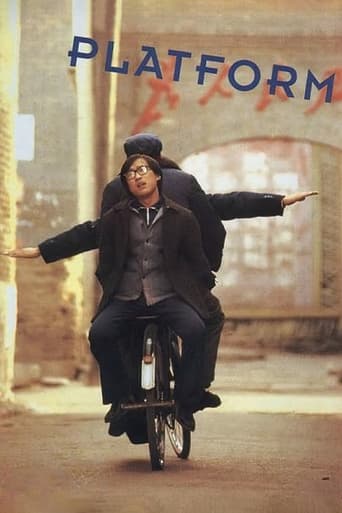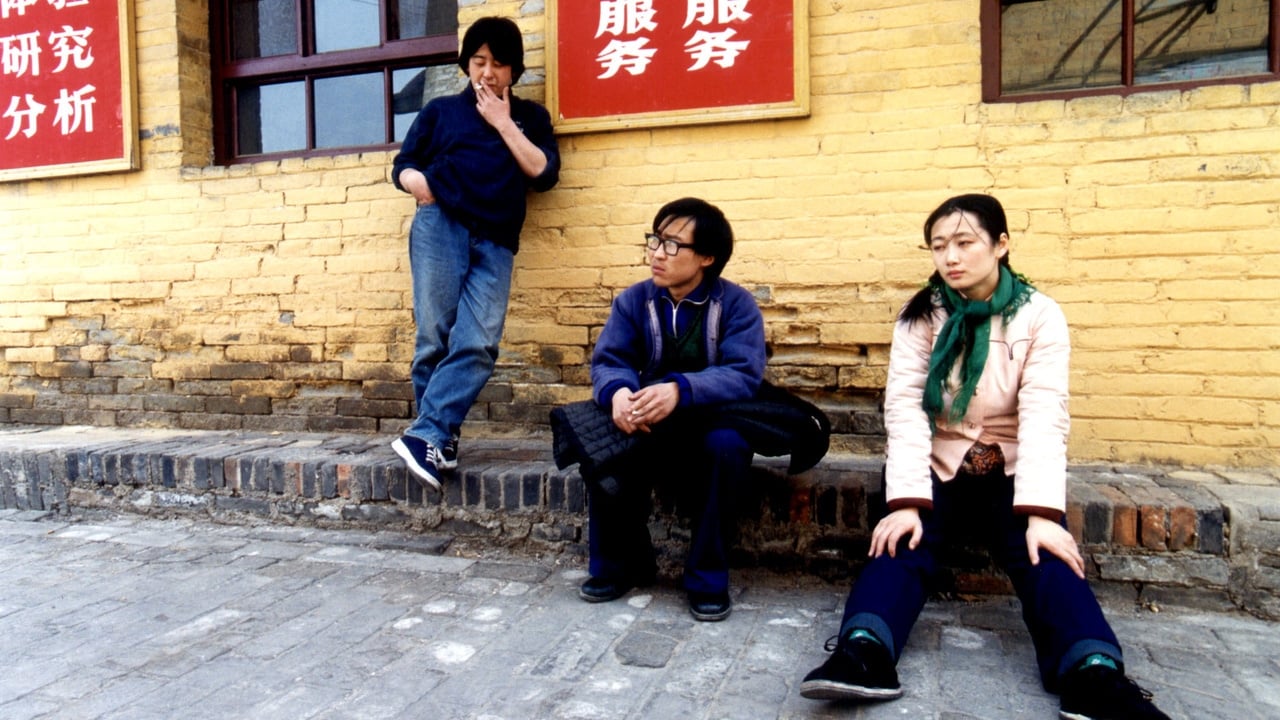kmethi
This is one of my all-time favorite films for all the reasons identified by other reviewers. Until recently, I had only seen the 154 minute version, which was released in theaters and on DVD. I just saw the original, uncut version, which is 193 minutes long, and it is markedly superior. Not only does it fill in many of the gaps that make the shorter version seem somewhat disjointed, it has several brilliant scenes that had me shaking my head wondering why they were cut from the theatrical/DVD release. I understand that Jia Zhangke is working on a director's cut of the film, which will hopefully do some necessary trimming, but also restore these scenes.
YNOTswim
It took me almost three hours, finally I finished another film by Jia Zhang Ke's called "Platform." Now I have seen all three of his so called "hometown trilogy": "Xiao Wu," "Platform," and "Unknown Pleasures.""Platform" tells stories of a group of young people in a small town in Shanxi Province in the 80s. China was emerging from the damage due to the 10 years long Cultural Revolution, and these young people rode the waves of the changes in the Chinese society searching for their positions in the new social structure.Like Jia's other films, this film does a good job on capturing the details of the lives of the ordinary people, especially those on the very bottom of the society. But it's like a broken container trying to hold its ingredient together. You see those cooking materials are scattered around all over the place but they are never put together to make a delicious dish. It doesn't have a focus.I am not sure if the film maker did it intentionally or because he was using those "non-professional" actors, the camera always stays far away from its object and it almost never gets a close up on these characters. It makes me a bystander to watch what happens to these characters standing in distance. It's very frustrating not to be able to get closer and get connected to those characters.By the way, I have no idea why the director Jia Zhang Ke is so obsessed with this guy Wang Hong Wei. Wang is the lead actor in every one of Jia's film. I start to think that Wang is the mafia boss and has total control of Jia. Otherwise, how can I explain this phenomenon after I see most of Jia's films? This is an interesting film to check out, especially if you have the patience and time, but not a great film.
zetes
I definitely liked this film much better than Jia's Unknown Pleasures, his follow-up, but I still wouldn't call it great. Platform is a very amorphous film. Perhaps it has more meaning to those who might know the referents better than I, the various places in China which are visited. But the fact remains that the loose, repetitive, episodic structure mixed with the total lack of character development hinder much of the possible enjoyment or involvement. I know it's not cool for a certain sector of Chinese art films to allow the audience to give a crap what's going on. But, surprisingly, I did enjoy it to a fair extent. You kind of feel like you're part of the performance troupe in the film, that you're being carted between these sections of nowhere around the vast country. There are many beautiful scenes. It's worthwhile. I suggest, given its 2.5 hour running length, to watch it in bits and pieces. It won't feel quite as repetitive.
cranesareflying
I found this to be an extremely understated film style, so emotionally detached throughout, a very oblique presentation, with little or no narrative, this played like a documentary with very little embellishments.
The film is set in the decade of the 1980's, which opens needing Communist Party approval for all State sponsored art, so kids are seen bored stiff at lifeless cultural performances singing the praises of China only in the most affirmative manner, something akin to pre-school exhibitions here, glorified by an always shining sun and by beautiful bright colors, but in this film, no one is fooled by this. Initial images are shot in near darkness or with the bleakest of light and there's a kind of feint, glowing aura surrounding such diminished light.
Initially there is obviously no heat or electricity in this cold, barren, wintry landscape, so each image features frost on the breath and the cold, desolate interior brick rooms, occasionally, people gather around a stove for warmth, they really don't want to move at all, bricks dominate the exteriors as well, the obvious poverty in the images is similar to many Iranian films, as there is absolutely nothing to grab the interest of the graduating high school class, who have no expectations of a better life, yet they are constantly seen interacting, but largely avoiding one another, smoking, staring off into the barren landscape, saying little or nothing, unbelievably detached from the rest of the world, and each other.The imagery was quite unique, as this small town is, in fact, a rural Communist collective work farm, complete with required Party meetings where all are asked to voice their opinions or stand up to the critical discussions led by the Communist group leader, again, the decade opens with a criticism of individual dissent, like the wearing of bell-bottom pants, establishing an absolute need for individualism, which drives a whirlwind of changes within the Party, leading to the introduction of electricity to the most outer rural regions, and to concepts like privatization, owning your own farm, and, why not, western style pop music, which gives rise to an opportunity for this little group of would be artists to form a band and hit the road through some of the most desolate and empty terrain on the planet, always they travel on the back of the truck searching for the world outside.
Two of the most powerful images in the film, both very much in the Kiarostami-style end shot, a long, drawn out shot that by itself, reveals the story of the film...
There is a long shot of a group of rolling hills with nothing growing on them, round and bare, and the infamous truck winds it's way along a wind-swept, dirt road around a myriad of curves until it is finally close to the camera, but then the truck mysteriously stops, and turns around in the most deliberate and laborious manner before heading back into those rolling hills, while this is seen, the audience hears the sound of the truck radio providing a weather report, powerful, changing winds are heading their way...
There is a long, distant shot of this same, infamous truck and it appears to be stuck in the middle of nowhere, far off, in the distance, the sound of the engine gunning is all that's heard, but no wheels are turning, they ar e going nowhere, so there is a cut to the blue door of the truck, one of the artists climbs into the front seat and turns on the radio which plays the title song, "Platform," "We are waiting, our whole hearts are waiting, waiting forever..." In this unique moment, the first time rock music is heard in the film, the audience is made aware that from this barren desolation there are now "possibilities."
However, as the decade comes to a close, this image is contrasted against a later scene where the actual band plays this song, "Platform," and one can only describe it as laughable, the audience is throwing things at them, the lead singer attempts to go out into the crowd and touch hands but he is nearly beaten up until he retreats to the safety of the stage, yet still under the barrage of the audience, certainly this reflects the end of possibilities...
Yet another scene must be mentioned, one of their former girl friends who chose not to go on the road, but to stay at home, is seen alone in a bureaucratic office, again, dimly lit, she waters her plants in the corner, shuffles some papers around, but the music heard on the radio causes her to stir, she stops her routine, makes the briefest of moves as if she wants to dance, but stops herself, until this slowly evolves into one of the most beautiful traditional Chinese dances, alone, in the dark, dancing.
True to the peculiarity of this film, one character appears with the band, he has long black hair, and he's dressed all in black, the band manager tells him to get his lazy ass back to the group, as he's outside smoking a cigarette, one of the most prevalent images throughout the film is the constant smoking of cigarettes, but this guy never says a word to anybody, nor is he ever seen performing with the band, he just exists totally outside the universe of any known reality, later on, he is seen cutting his hair, this character is not seen in the entire film interacting with anyone, yet he is seen on the fringes definitely a unique character, but totally alone.
In many ways this is largely a wordless film, as the words are so meaningless, instead, eyes drift off into the distant landscape, and the sound of the film is filled with the noises of humans, street sounds, traffic, trucks, tractors, distant shouts or street chatter, radios, the noises of humans, this is really the theme of the film, the individuals are incidental, they come, they go, but the constant is the noise.


 AD
AD
